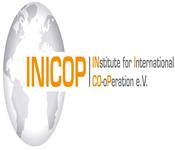Theme: Advocating Waste Disposal and Recycling Practices for Clean and Green Environment
Waste Recycling Congress 2018
Conference series LLC Ltd Organizes a Conference series of 1000+ Global Events inclusive of 300+ Conferences, 900+ Upcoming and Previous Symposiums and Workshops in USA, Europe & Asia with support from 1000 more Scientific societies and Publishes 700+ Open access Journals which contain over 30000 Eminent personalities, Reputed Scientists as Editorial board members.
Recycling and Waste Management Convention 2018 proudly invites contributors across the globe to 9th World Convention on Recycling and Waste Management during October 22-23,2018 in Osaka, Japan, which includes prompt keynote presentations, Oral talks, Poster presentations and Exhibitions. We are delighted to say that it is the 9th World Convention on Recycling and Waste Management which will be held in a beautiful city of Osaka, Japan and hence we invite you all to attend and register.
9th World Convention on Recycling and Waste Management is mainly based on the theme “Advocating Waste Disposal and Recycling Practices for Clean and Green Environment’’ We warmly welcome all the participants of World’s leading Scientists, Researchers and Scholars to attend the Convention. We provide a platform for young Researchers and Students to present their Research through oral Presentations through which they can develop a foundation for collaboration among young Researchers.The Organizing committee aims at setting a platform for all the budding Scientists and Researchers to present their real-time work and share their views and aspects related to the theme of the Conference. The Organizing committee is gearing up for an exciting and informative Conference program including plenary Lectures, Symposia, Workshops on a variety of topics, Poster presentations and various programs for participants from all over the World.
Theme : Advocating Waste Disposal and Recycling Practices for Clean and Green Environment
Track 1 Environmental chemistry :
Environmental chemistry is the study of chemical and biochemical processes occurring in nature. These impacts may be felt on a local scale, through the presence of urban air pollutants or toxic substances arising from a waste site, or on a global scale, through depletion of stratospheric ozone or global warming. However, it is important to realize that all forms of matter in our environment whether synthetic or natural are made of chemicals.
Related Conferences: Recycling Conferences | Waste Management Conferences | Plastic Recycling Conferences | Solid Waste and Recycling Conferences | Environmental Science Meetings |
International Convention on Global warming and Climate Change , March 21, 22 - 2018, Singapore; World Congress on Environmental Toxicology and Health, July 11-12, 2018 Sydney, Australia; 2nd Annual Congress on Environmental Pollution and Global Warming, May 24-25, 2018 Osaka, Japan; World Conference on Ecology , March 19-20, 2018 Berlin, Germany; 3rd International Conference on Coastal Zones and Marine Ecosystems, March 15-16, 2018, Singapore; 2nd World Summit on Recycling And Environmental Management, November 20-22, Canada; 33rd International Conference on Solid Waste Technology and Management, March 11-14, 2018, Annapolis (Washington, D.C.) U.S.A;
Related Associations: Maine Resource Recovery Association, South Dakota Solid Waste Management Association, Wyoming Solid Waste Recycling Association, Environmental Services Association, Municipal Waste Management Association, Japan Plastic Recycle & Development Association, Wood Recyclers Association.
Reduce: this entails the deliberate lowering on the amount of plastics an individual uses in their day to day life. Reuse: this involves putting to use plastics that have already been used. This can mean putting them to better use than just throwing them away. Recycle: The basic phases in recycling are the collection of waste materials, their processing or manufacture into new products, and the purchase of those products, which may then themselves be recycled. Recycling can help reduce the quantities of solid waste deposited in landfills, which have become increasingly expensive. Recovery: this entails the insistence on not using plastic but rather finding and using existing alternatives.
Manufacturing products from recycled materials consumes less energy and produces less pollution than producing the same items from virgin materials. Reducing our use of virgin materials conserves natural resources like trees, water and minerals.
Related Conferences: Recycling Conferences | Waste Management Conferences | Plastic recycling Conferences | Solid Waste and Recycling Conferences | Environmental Science Meetings
International Convention on Global warming and Climate Change , March 21, 22 - 2018, Singapore; World Congress on Environmental Toxicology and Health, July 11-12, 2018 Sydney, Australia; 2nd Annual Congress on Environmental Pollution and Global Warming, May 24-25, 2018 Osaka, Japan; World Conference on Ecology , March 19-20, 2018 Berlin, Germany; 3rd International Conference on Coastal Zones and Marine Ecosystems, March 15-16, 2018, Singapore; 2nd World Summit on Recycling And Environmental Management, November 20-22, Canada; 33rd International Conference on Solid Waste Technology and Management, March 11-14, 2018, Annapolis (Washington, D.C.) U.S.A;
Related Associations: Maine Resource Recovery Association, South Dakota Solid Waste Management Association, Wyoming Solid Waste Recycling Association, Environmental Services Association, Municipal Waste Management Association, Japan Plastic Recycle & Development Association, Wood Recyclers Association.
Track 3 Waste and Biomass Valorization:
Waste and Biomass Valorization is the process of treatment of waste for (landfill) disposal, storage, and in some cases sorting. In the 1990s, depletion of raw materials and socio-economic concerns supported the direct recycling of waste and residues. Various valorization techniques are currently showing promise in meeting industrial demands. Waste and Biomass Valorization is the process of treatment of waste for (landfill) disposal, storage, and in some cases sorting. Various valorization techniques are currently showing promise in meeting industrial demands. Due to depletion of natural resources, increasing greenhouse emissions and awareness of the need for sustainable development in terms of safely reusing waste and biomass, the transformation of waste/biomass to valuable materials and energy is emerging as a strong trend.
Related Conferences: Recycling Conferences | Waste Management Conferences | Plastic recycling Conferences | Solid Waste and Recycling Conferences | Environmental Science Meetings |
International Convention on Global warming and Climate Change , March 21, 22 - 2018, Singapore; World Congress on Environmental Toxicology and Health, July 11-12, 2018 Sydney, Australia; 2nd Annual Congress on Environmental Pollution and Global Warming, May 24-25, 2018 Osaka, Japan; World Conference on Ecology , March 19-20, 2018 Berlin, Germany; 3rd International Conference on Coastal Zones and Marine Ecosystems, March 15-16, 2018, Singapore; 2nd World Summit on Recycling And Environmental Management, November 20-22, Canada; 33rd International Conference on Solid Waste Technology and Management, March 11-14, 2018, Annapolis (Washington, D.C.) U.S.A;
Related Associations: Maine Resource Recovery Association, South Dakota Solid Waste Management Association, Wyoming Solid Waste Recycling Association, Environmental Services Association, Municipal Waste Management Association, Japan Plastic Recycle & Development Association, Wood Recyclers Association.
Biofuel is energy made from living matter, usually plants. Biofuels are considered renewable energies, emit less than fossil fuels, and have received increasing attention in the transition to a low-carbon economy. Biodiesel, a biofuel made primarily from oily plants and algae and to a lesser extent from other oily sources (such as waste cooking fat from restaurant deep-frying). Biodiesel, which has found greatest acceptance in Europe, is used in diesel engines and is usually blended with petroleum diesel fuel in various percentages.
Related Conferences: Recycling Conferences | Waste Management Conferences | Plastic recycling Conferences | Solid Waste and Recycling Conferences | Environmental Science Meetings |
International Convention on Global warming and Climate Change , March 21, 22 - 2018, Singapore; World Congress on Environmental Toxicology and Health, July 11-12, 2018 Sydney, Australia; 2nd Annual Congress on Environmental Pollution and Global Warming, May 24-25, 2018 Osaka, Japan; World Conference on Ecology , March 19-20, 2018 Berlin, Germany; 3rd International Conference on Coastal Zones and Marine Ecosystems, March 15-16, 2018, Singapore; 2nd World Summit on Recycling And Environmental Management, November 20-22, Canada; 33rd International Conference on Solid Waste Technology and Management, March 11-14, 2018, Annapolis (Washington, D.C.) U.S.A;
Related Associations: Maine Resource Recovery Association, South Dakota Solid Waste Management Association, Wyoming Solid Waste Recycling Association, Environmental Services Association, Municipal Waste Management Association, Japan Plastic Recycle & Development Association, Wood Recyclers Association.
Bio-Electrochemical Treatment Systems use microorganisms to catalyze different electrochemical reactions, as well as generating electrical power from wastes, the generation of many different chemical products or biofuels, and the removal of organic, and/or inorganic compounds from water flows. Groundwater, as the main resource of drinking water, is usually characterized by low conductivity (less than 1 MS cm-1. The development of Bio-Electrochemical treatment system requires expertise in electrochemistry, materials, sciences, microbiology, engineering, and other fields.
Related Conferences: Recycling Conferences | Waste Management Conferences | Plastic recycling Conferences | Solid Waste and Recycling Conferences | Environmental Science Meetings |
International Convention on Global warming and Climate Change , March 21, 22 - 2018, Singapore; World Congress on Environmental Toxicology and Health, July 11-12, 2018 Sydney, Australia; 2nd Annual Congress on Environmental Pollution and Global Warming, May 24-25, 2018 Osaka, Japan; World Conference on Ecology , March 19-20, 2018 Berlin, Germany; 3rd International Conference on Coastal Zones and Marine Ecosystems, March 15-16, 2018, Singapore; 2nd World Summit on Recycling And Environmental Management, November 20-22, Canada; 33rd International Conference on Solid Waste Technology and Management, March 11-14, 2018, Annapolis (Washington, D.C.) U.S.A;
Related Associations: Maine Resource Recovery Association, South Dakota Solid Waste Management Association, Wyoming Solid Waste Recycling Association, Environmental Services Association, Municipal Waste Management Association, Japan Plastic Recycle & Development Association, Wood Recyclers Association.
Track 6 Bio- Plastics:
Bio-plastic, moldable plastic material made up of chemical compounds that are synthesized by microbes such as bacteria or by genetically modified plants. Applications of bio-plastics cover a wide area ranging from rigid and flexible packaging materials, including food and drinks containers, dining utensils, electronic devices, to automotive and airplane parts, cable sheaths and casings, noise and thermal insulation panels etc.
Related Conferences: Recycling Conferences | Waste Management Conferences | Plastic recycling Conferences | Solid Waste and Recycling Conferences | Environmental Science Meetings |
International Convention on Global warming and Climate Change , March 21, 22 - 2018, Singapore; World Congress on Environmental Toxicology and Health, July 11-12, 2018 Sydney, Australia; 2nd Annual Congress on Environmental Pollution and Global Warming, May 24-25, 2018 Osaka, Japan; World Conference on Ecology , March 19-20, 2018 Berlin, Germany; 3rd International Conference on Coastal Zones and Marine Ecosystems, March 15-16, 2018, Singapore; 2nd World Summit on Recycling And Environmental Management, November 20-22, Canada; 33rd International Conference on Solid Waste Technology and Management, March 11-14, 2018, Annapolis (Washington, D.C.) U.S.A;
Related Associations: Maine Resource Recovery Association, South Dakota Solid Waste Management Association, Wyoming Solid Waste Recycling Association, Environmental Services Association, Municipal Waste Management Association, Japan Plastic Recycle & Development Association, Wood Recyclers Association.
Track 7 Solid Waste Management:
Solid waste management refers to all activities pertaining to the control of generation, storage, collection, transfer, and transport, treatment and processing, and disposal of solid wastes in accordance with the best principles of public health, economics, engineering, conservation, aesthetic, and other environmental consideration.
Related Conferences: Recycling Conferences | Waste Management Conferences | Plastic recycling Conferences | Solid Waste and Recycling Conferences | Environmental Science Meetings |
International Convention on Global warming and Climate Change , March 21, 22 - 2018, Singapore; World Congress on Environmental Toxicology and Health, July 11-12, 2018 Sydney, Australia; 2nd Annual Congress on Environmental Pollution and Global Warming, May 24-25, 2018 Osaka, Japan; World Conference on Ecology , March 19-20, 2018 Berlin, Germany; 3rd International Conference on Coastal Zones and Marine Ecosystems, March 15-16, 2018, Singapore; 2nd World Summit on Recycling And Environmental Management, November 20-22, Canada; 33rd International Conference on Solid Waste Technology and Management, March 11-14, 2018, Annapolis (Washington, D.C.) U.S.A;
Related Associations: Maine Resource Recovery Association, South Dakota Solid Waste Management Association, Wyoming Solid Waste Recycling Association, Environmental Services Association, Municipal Waste Management Association, Japan Plastic Recycle & Development Association, Wood Recyclers Association.
Track 8 Renewable Resources:
Renewable resources can be described as a rather tricky balancing act. Renewable resource intake and use commonly do not yield decomposition or contribute to global warming. It is easy to recognize the environmental advantages of utilizing the alternative and renewable forms of energy but we must also be aware of the disadvantages. It can be crucial to develop the capacity of electricity that is as large as those produced by traditional fossil fuel generators.
Related Conferences: Recycling Conferences | Waste Management Conferences | Plastic recycling Conferences | Solid Waste and Recycling Conferences | Environmental Science Meetings |
International Convention on Global warming and Climate Change , March 21, 22 - 2018, Singapore; World Congress on Environmental Toxicology and Health, July 11-12, 2018 Sydney, Australia; 2nd Annual Congress on Environmental Pollution and Global Warming, May 24-25, 2018 Osaka, Japan; World Conference on Ecology , March 19-20, 2018 Berlin, Germany; 3rd International Conference on Coastal Zones and Marine Ecosystems, March 15-16, 2018, Singapore; 2nd World Summit on Recycling And Environmental Management, November 20-22, Canada; 33rd International Conference on Solid Waste Technology and Management, March 11-14, 2018, Annapolis (Washington, D.C.) U.S.A;
Related Associations: Maine Resource Recovery Association, South Dakota Solid Waste Management Association, Wyoming Solid Waste Recycling Association, Environmental Services Association, Municipal Waste Management Association, Japan Plastic Recycle & Development Association, Wood Recyclers Association.
Track 9 Waste Water treatments:
Wastewater treatment processes are arranged to achieve improvements in the quality of the wastewater. The various treatment processes may reduce Suspended solids physical particles that can clog rivers or channels as they settle under gravity. Pathogenic bacteria and other disease causing organisms these are most relevant where the receiving water is used for drinking, or where people would otherwise be in close contact with it; and Nutrients, including nitrates and phosphates. Universally used terminology refers to three levels of wastewater treatment: primary, secondary, and tertiary.
Related Conferences: Recycling Conferences | Waste Management Conferences | Plastic recycling Conferences | Solid Waste and Recycling Conferences | Environmental Science Meetings |
International Convention on Global warming and Climate Change , March 21, 22 - 2018, Singapore; World Congress on Environmental Toxicology and Health, July 11-12, 2018 Sydney, Australia; 2nd Annual Congress on Environmental Pollution and Global Warming, May 24-25, 2018 Osaka, Japan; World Conference on Ecology , March 19-20, 2018 Berlin, Germany; 3rd International Conference on Coastal Zones and Marine Ecosystems, March 15-16, 2018, Singapore; 2nd World Summit on Recycling And Environmental Management, November 20-22, Canada; 33rd International Conference on Solid Waste Technology and Management, March 11-14, 2018, Annapolis (Washington, D.C.) U.S.A;
Related Associations: Maine Resource Recovery Association, South Dakota Solid Waste Management Association, Wyoming Solid Waste Recycling Association, Environmental Services Association, Municipal Waste Management Association, Japan Plastic Recycle & Development Association, Wood Recyclers Association.
Track 10 Bioremediation:
Bioremediation is becoming the technology of choice for the remediation of many contaminated environments, particularly sites contaminated with petroleum hydrocarbons. Bioremediation stimulates the growth of certain microbes that use contaminants as a source of food and energy.
Related Conferences: Recycling Conferences | Waste Management Conferences | Plastic recycling Conferences | Solid Waste and Recycling Conferences | Environmental Science Meetings |
International Convention on Global warming and Climate Change , March 21, 22 - 2018, Singapore; World Congress on Environmental Toxicology and Health, July 11-12, 2018 Sydney, Australia; 2nd Annual Congress on Environmental Pollution and Global Warming, May 24-25, 2018 Osaka, Japan; World Conference on Ecology , March 19-20, 2018 Berlin, Germany; 3rd International Conference on Coastal Zones and Marine Ecosystems, March 15-16, 2018, Singapore; 2nd World Summit on Recycling And Environmental Management, November 20-22, Canada; 33rd International Conference on Solid Waste Technology and Management, March 11-14, 2018, Annapolis (Washington, D.C.) U.S.A;
Related Associations: Maine Resource Recovery Association, South Dakota Solid Waste Management Association, Wyoming Solid Waste Recycling Association, Environmental Services Association, Municipal Waste Management Association, Japan Plastic Recycle & Development Association, Wood Recyclers Association.
Track 11 E-Wastes:
The composition of E-waste is diverse, containing more than 1,000 different toxic and non-toxic substances. Electronic waste (e-waste) products have exhausted their utility value through redundancy, replacement, or breakage and include both “white goods” such as refrigerators, washing machines, and microwaves and “brown goods” such as televisions, radios, computers, and cell phones.
Related Conferences: Recycling Conferences | Waste Management Conferences | Plastic recycling Conferences | Solid Waste and Recycling Conferences | Environmental Science Meetings |
International Convention on Global warming and Climate Change , March 21, 22 - 2018, Singapore; World Congress on Environmental Toxicology and Health, July 11-12, 2018 Sydney, Australia; 2nd Annual Congress on Environmental Pollution and Global Warming, May 24-25, 2018 Osaka, Japan; World Conference on Ecology , March 19-20, 2018 Berlin, Germany; 3rd International Conference on Coastal Zones and Marine Ecosystems, March 15-16, 2018, Singapore; 2nd World Summit on Recycling And Environmental Management, November 20-22, Canada; 33rd International Conference on Solid Waste Technology and Management, March 11-14, 2018, Annapolis (Washington, D.C.) U.S.A;
Related Associations: Maine Resource Recovery Association, South Dakota Solid Waste Management Association, Wyoming Solid Waste Recycling Association, Environmental Services Association, Municipal Waste Management Association, Japan Plastic Recycle & Development Association, Wood Recyclers Association.
Track 12 Bio- Energy from Waste:
The potential for increasing total traditional biomass utilization for energy purposes is limited. The thrust of the activities is therefore twofold, one aim is to broaden the scope of biomass utilization into upgrading and the other aim is to broaden the biofuel base as such. This in turn implies an enhanced focus on fuels for transportation and power generation with respect to traditional biomass and a focus on direct heating for more complex biomass, such as waste etc.
Related Conferences: Recycling Conferences | Waste Management Conferences | Plastic recycling Conferences | Solid Waste and Recycling Conferences | Environmental Science Meetings |
International Convention on Global warming and Climate Change , March 21, 22 - 2018, Singapore; World Congress on Environmental Toxicology and Health, July 11-12, 2018 Sydney, Australia; 2nd Annual Congress on Environmental Pollution and Global Warming, May 24-25, 2018 Osaka, Japan; World Conference on Ecology , March 19-20, 2018 Berlin, Germany; 3rd International Conference on Coastal Zones and Marine Ecosystems, March 15-16, 2018, Singapore; 2nd World Summit on Recycling and Environmental Management, November 20-22, Canada; 33rd International Conference on Solid Waste Technology and Management, March 11-14, 2018, Annapolis (Washington, D.C.) U.S.A;
Related Associations: Maine Resource Recovery Association, South Dakota Solid Waste Management Association, Wyoming Solid Waste Recycling Association, Environmental Services Association, Municipal Waste Management Association, Japan Plastic Recycle & Development Association, Wood Recyclers Association.
Track 13 Sustainable waste Management:
Sustainable waste Management system incorporates feedback loops, is focused on processes, embodies adaptability and diverts wastes from disposal. Sustainability is at the origin of concepts such as sustainable yield, sustainable society, and sustainable development. Discover some of the visionary ways that we're turning waste into a resource for a brighter, more sustainable future.
Related Conferences: Recycling Conferences | Waste Management Conferences | Plastic recycling Conferences | Solid Waste and Recycling Conferences | Environmental Science Meetings |
International Convention on Global warming and Climate Change , March 21, 22 - 2018, Singapore; World Congress on Environmental Toxicology and Health, July 11-12, 2018 Sydney, Australia; 2nd Annual Congress on Environmental Pollution and Global Warming, May 24-25, 2018 Osaka, Japan; World Conference on Ecology , March 19-20, 2018 Berlin, Germany; 3rd International Conference on Coastal Zones and Marine Ecosystems, March 15-16, 2018, Singapore; 2nd World Summit on Recycling And Environmental Management, November 20-22, Canada; 33rd International Conference on Solid Waste Technology and Management, March 11-14, 2018, Annapolis (Washington, D.C.) U.S.A;
Related Associations: Maine Resource Recovery Association, South Dakota Solid Waste Management Association, Wyoming Solid Waste Recycling Association, Environmental Services Association, Municipal Waste Management Association, Japan Plastic Recycle & Development Association, Wood Recyclers Association.
Track 14 Environmental impact Assessment:
The objective of Environmental Impact Assessment is to rectify and evaluate the potential impacts of development and projects on the environmental system. The objective of Environmental Impact Assessment is (i) to identify, predict and classify the economic, environmental and social impact of development activities (ii) to provide information on the environmental consequences for decision making and (iii) to promote environmentally sound and sustainable development through the identification of appropriate alternatives and mitigation measures.
Related Conferences: Recycling Conferences | Waste Management Conferences | Plastic recycling Conferences | Solid Waste and Recycling Conferences | Environmental Science Meetings |
International Convention on Global warming and Climate Change , March 21, 22 - 2018, Singapore; World Congress on Environmental Toxicology and Health, July 11-12, 2018 Sydney, Australia; 2nd Annual Congress on Environmental Pollution and Global Warming, May 24-25, 2018 Osaka, Japan; World Conference on Ecology , March 19-20, 2018 Berlin, Germany; 3rd International Conference on Coastal Zones and Marine Ecosystems, March 15-16, 2018, Singapore; 2nd World Summit on Recycling And Environmental Management, November 20-22, Canada; 33rd International Conference on Solid Waste Technology and Management, March 11-14, 2018, Annapolis (Washington, D.C.) U.S.A;
Related Associations: Maine Resource Recovery Association, South Dakota Solid Waste Management Association, Wyoming Solid Waste Recycling Association, Environmental Services Association, Municipal Waste Management Association, Japan Plastic Recycle & Development Association, Wood Recyclers Association.
Track 15 Remote Sensing and Satellite Technology:
Remote Sensing refers to the science of identification of Earth surface features and estimation of their
biophysical properties using electromagnetic radiation as a medium of interaction.
Satellite technology in an equatorial circular orbit at a distance is approximately 42,164km from the
Earth station, i.e. approximately 35,787km above mean sea level, which has a period equal to the Earth’s rotation
on its axis and would remain geostationary over the same point on the Earth equator.
Related Conferences: Recycling Conferences | Waste Management Conferences | Plastic recycling Conferences | Solid Waste and Recycling Conferences | Environmental Science Meetings |
International Convention on Global warming and Climate Change , March 21, 22 - 2018, Singapore; World Congress on Environmental Toxicology and Health, July 11-12, 2018 Sydney, Australia; 2nd Annual Congress on Environmental Pollution and Global Warming, May 24-25, 2018 Osaka, Japan; World Conference on Ecology , March 19-20, 2018 Berlin, Germany; 3rd International Conference on Coastal Zones and Marine Ecosystems, March 15-16, 2018, Singapore; 2nd World Summit on Recycling And Environmental Management, November 20-22, Canada; 33rd International Conference on Solid Waste Technology and Management, March 11-14, 2018, Annapolis (Washington, D.C.) U.S.A;
Related Associations: Maine Resource Recovery Association, South Dakota Solid Waste Management Association, Wyoming Solid Waste Recycling Association, Environmental Services Association, Municipal Waste Management Association, Japan Plastic Recycle & Development Association, Wood Recyclers Association.
Track 16 Landfills:
A landfill is a carefully constructed and monitored structure that isolates trash from the surrounding environment. This isolation is accomplished with the use of a bottom liner and daily covering of soil. Landfills need expert design as well as professional operators and a proper management to guarantee their functionality. A secure hazardous-waste landfill must have two impermeable liners and leachate collection systems.
Related Conferences: Recycling Conferences | Waste Management Conferences | Plastic recycling Conferences | Solid Waste and Recycling Conferences | Environmental Science Meetings |
International Convention on Global warming and Climate Change , March 21, 22 - 2018, Singapore; World Congress on Environmental Toxicology and Health, July 11-12, 2018 Sydney, Australia; 2nd Annual Congress on Environmental Pollution and Global Warming, May 24-25, 2018 Osaka, Japan; World Conference on Ecology , March 19-20, 2018 Berlin, Germany; 3rd International Conference on Coastal Zones and Marine Ecosystems, March 15-16, 2018, Singapore; 2nd World Summit on Recycling And Environmental Management, November 20-22, Canada; 33rd International Conference on Solid Waste Technology and Management, March 11-14, 2018, Annapolis (Washington, D.C.) U.S.A;
Related Associations: Maine Resource Recovery Association, South Dakota Solid Waste Management Association, Wyoming Solid Waste Recycling Association, Environmental Services Association, Municipal Waste Management Association, Japan Plastic Recycle & Development Association, Wood Recyclers Association.
Track 17 Microbial Fuel cell Technology:
Microbial fuel cells utilize waste carbohydrates as fuel. A microbial fuel cell made with collaboration of micro fluids, micro/Nano technology, and bioenergy. It focuses on the developing scalable microbial fuel cell array that enables parallel analysis of electricigens, microbes that can directly produce electricity.
Related Conferences: Recycling Conferences | Waste Management Conferences | Plastic recycling Conferences | Solid Waste and Recycling Conferences | Environmental Science Meetings |
International Convention on Global warming and Climate Change , March 21, 22 - 2018, Singapore; World Congress on Environmental Toxicology and Health, July 11-12, 2018 Sydney, Australia; 2nd Annual Congress on Environmental Pollution and Global Warming, May 24-25, 2018 Osaka, Japan; World Conference on Ecology , March 19-20, 2018 Berlin, Germany; 3rd International Conference on Coastal Zones and Marine Ecosystems, March 15-16, 2018, Singapore; 2nd World Summit on Recycling And Environmental Management, November 20-22, Canada; 33rd International Conference on Solid Waste Technology and Management, March 11-14, 2018, Annapolis (Washington, D.C.) U.S.A;
Related Associations: Maine Resource Recovery Association, South Dakota Solid Waste Management Association, Wyoming Solid Waste Recycling Association, Environmental Services Association, Municipal Waste Management Association, Japan Plastic Recycle & Development Association, Wood Recyclers Association.
Track 18 Recycling Business:
Recycling business waste means limited disposal to landfill and less overall harm to the environment. In Recycling business you can attract new customers, enhance your chances of winning contracts and improve customer loyalty by demonstrating your environmental responsibility through recycling efforts.
Related Conferences: Recycling Conferences | Waste Management Conferences | Plastic recycling Conferences | Solid Waste and Recycling Conferences | Environmental Science Meetings |
International Convention on Global warming and Climate Change , March 21, 22 - 2018, Singapore; World Congress on Environmental Toxicology and Health, July 11-12, 2018 Sydney, Australia; 2nd Annual Congress on Environmental Pollution and Global Warming, May 24-25, 2018 Osaka, Japan; World Conference on Ecology , March 19-20, 2018 Berlin, Germany; 3rd International Conference on Coastal Zones and Marine Ecosystems, March 15-16, 2018, Singapore; 2nd World Summit on Recycling And Environmental Management, November 20-22, Canada; 33rd International Conference on Solid Waste Technology and Management, March 11-14, 2018, Annapolis (Washington, D.C.) U.S.A;
Related Associations: Maine Resource Recovery Association, South Dakota Solid Waste Management Association, Wyoming Solid Waste Recycling Association, Environmental Services Association, Municipal Waste Management Association, Japan Plastic Recycle & Development Association, Wood Recyclers Association.
Track 19 Waste Treatment Technologies:
There are a number of different waste treatment technologies for the disposal, recycling, storage, or energy recovery from different waste types. Each type has its own associated of waste Management. Relatively simple waste treatment technologies can be designed to provide low cost sanitation and environmental protection while providing additional benefits from the reuse of resources. These technologies use natural aquatic and terrestrial systems.
Related Conferences: Recycling Conferences | Waste Management Conferences | Plastic recycling Conferences | Solid Waste and Recycling Conferences | Environmental Science Meetings |
International Convention on Global warming and Climate Change , March 21, 22 - 2018, Singapore; World Congress on Environmental Toxicology and Health, July 11-12, 2018 Sydney, Australia; 2nd Annual Congress on Environmental Pollution and Global Warming, May 24-25, 2018 Osaka, Japan; World Conference on Ecology , March 19-20, 2018 Berlin, Germany; 3rd International Conference on Coastal Zones and Marine Ecosystems, March 15-16, 2018, Singapore; 2nd World Summit on Recycling And Environmental Management, November 20-22, Canada; 33rd International Conference on Solid Waste Technology and Management, March 11-14, 2018, Annapolis (Washington, D.C.) U.S.A;
Related Associations: Maine Resource Recovery Association, South Dakota Solid Waste Management Association, Wyoming Solid Waste Recycling Association, Environmental Services Association, Municipal Waste Management Association, Japan Plastic Recycle & Development Association, Wood Recyclers Association.
Track 20 Waste Processing Industries:
The progressive development of the waste processing industry derives directly from the rapid progress in packaging industry. In addition to the inevitable scrap or reject production loads of in-process waste is produced in packaging industry.
Related Conferences: Recycling Conferences | Waste Management Conferences | Plastic recycling Conferences | Solid Waste and Recycling Conferences | Environmental Science Meetings |
International Convention on Global warming and Climate Change , March 21, 22 - 2018, Singapore; World Congress on Environmental Toxicology and Health, July 11-12, 2018 Sydney, Australia; 2nd Annual Congress on Environmental Pollution and Global Warming, May 24-25, 2018 Osaka, Japan; World Conference on Ecology , March 19-20, 2018 Berlin, Germany; 3rd International Conference on Coastal Zones and Marine Ecosystems, March 15-16, 2018, Singapore; 2nd World Summit on Recycling And Environmental Management, November 20-22, Canada; 33rd International Conference on Solid Waste Technology and Management, March 11-14, 2018, Annapolis (Washington, D.C.) U.S.A;
Related Associations: Maine Resource Recovery Association, South Dakota Solid Waste Management Association, Wyoming Solid Waste Recycling Association, Environmental Services Association, Municipal Waste Management Association, Japan Plastic Recycle & Development Association, Wood Recyclers Association.
Track 21 Pollution and Climate Change:
Air pollution and climate changes are closely related. The main sources of CO2 emissions the extraction and burning of fossil fuels are not only key drivers of climate change, but also major sources of air pollutants. Furthermore, many air pollutants that are harmful to human health and ecosystems also contribute to climate change by affecting the amount of incoming sunlight that is reflected or absorbed by the atmosphere, with some pollutants warming and others cooling the Earth. These are called short-lived climate-forcing pollutants include methane, black carbon, ground-level ozone, and sulfate aerosols. They have significant impacts on the climate; black carbon and methane in particular are among the top contributors to global warming after CO2.
Related Conferences: Recycling Conferences | Waste Management Conferences | Plastic recycling Conferences | Solid Waste and Recycling Conferences | Environmental Science Meetings |
International Convention on Global warming and Climate Change , March 21, 22 - 2018, Singapore; World Congress on Environmental Toxicology and Health, July 11-12, 2018 Sydney, Australia; 2nd Annual Congress on Environmental Pollution and Global Warming, May 24-25, 2018 Osaka, Japan; World Conference on Ecology , March 19-20, 2018 Berlin, Germany; 3rd International Conference on Coastal Zones and Marine Ecosystems, March 15-16, 2018, Singapore; 2nd World Summit on Recycling And Environmental Management, November 20-22, Canada; 33rd International Conference on Solid Waste Technology and Management, March 11-14, 2018, Annapolis (Washington, D.C.) U.S.A;
Related Associations: Maine Resource Recovery Association, South Dakota Solid Waste Management Association, Wyoming Solid Waste Recycling Association, Environmental Services Association, Municipal Waste Management Association, Japan Plastic Recycle & Development Association, Wood Recyclers Association.
Recycling and Waste Management Convention 2018 proudly invites contributors across the globe to 9th World Convention on Recycling and Waste Management during October 22-23,2018 in Osaka, Japan, which includes prompt keynote presentations, Oral talks, Poster presentations and Exhibitions. We are delighted to say that it is the 9th World Convention on Recycling and Waste Management which will be held in a beautiful city of Osaka, Japan and hence we invite you all to attend and register.
9th World Convention on Recycling and Waste Management is mainly based on the theme “Promote Sustainability and go green’’ We warmly welcome all the participants of World’s leading Scientists, Researchers and Scholars to attend the Convention. We provide a platform for young Researchers and Students to present their Research through oral Presentations through which they can develop a foundation for collaboration among young Researchers.
The Organizing committee aims at setting a platform for all the budding Scientists and Researchers to present their real-time work and share their views and aspects related to the theme of the Conference. The Organizing committee is gearing up for an exciting and informative Conference program including plenary Lectures, Symposia, Workshops on a variety of topics, Poster presentations and various programs for participants from all over the World.
Conference series LLC Ltd Organizes a Conference series of 1000+ Global Events inclusive of 300+ Conferences, 900+ Upcoming and Previous Symposiums and Workshops in USA, Europe & Asia with support from 1000 more Scientific societies and Publishes 700+ Open access Journals which contain over 30000 Eminent personalities, Reputed Scientists as Editorial board members.
Summary:
The increasing trend in Recycling and Waste Management has increased. Recycling is a way of life. Once we have made that choice to implement all the steps of recycling in our daily lives, and stick to that choice every single day, recycling becomes second nature to us. Sure there will be lapses; it’s not easy for us creatures of habit. But no matter, we press on. Every small contribution to the recycling movement and the initiative to protect our Environment adds up to how our present Society eventually shapes our Nation’s and the Earth’s future. Waste Management or Waste disposal is all the activities and actions required to manage waste from its inception to its final disposal. Very one of us has an important role to play in reducing the quantity of waste buried in landfills. Sorting waste in order to recycle or compost it are efficient means to reduce garbage.
But why should we do it?
1. Because our consuming habits have evolved considerably since the previous generation. We consume more intensely as new products are put on the market and consequently, we produce an ever increasing amount of waste. Two-third of that waste can be either recycled or composted.
2. Because waste ending up in landfills produces leachate and landfill biogas that are harmful for the water we drink and the air we breathe. Biogas contains mainly methane, a greenhouse gas that is 29% more powerful than carbon dioxide (CO2).
3. Because the Management of our waste is a clean way of living that shows how much we respect the people closest to us. Waste sorting decisions we make today will encourage our children to learn and influence the quality of life of future generations.
Why to Attend?
The Conference will provide a forum for exchange of recent Research results among Researchers from all across the World focused on learning and sharing Knowledge upon use of recycling and for discussion of future challenges in implementation and application of latest Technologies and advances in this field. With members from around the world focused on learning about Recycling and Waste Management, this is your single best opportunity to reach the largest assemblage of participants from all over the World. Conduct demonstrations, distribute information, meet with current and potential customers, make a splash with a new product line, and receive name recognition at this 2-day event. Best Opportunity to Meet World-renowned speakers and to learn and share the most recent techniques, Theories and Technologies in the field of Recycling and Waste management. 9th World Convention on Recycling and Waste Management is an exciting opportunity to showcase the new Technology, the new products of your Company, and/or the service your Industry may offer to a broad International audience. It covers a lot of topics and it will be a nice platform to showcase their recent Researches on Recycling and Waste Management and other interesting topics.
Target Audience:
- ​ Research Scientists
- Recycling Associations
- Recycling Industries
- Recycling Researchers
- Business Entrepreneurs
- Environmental Academia’s
- Ecologists
- Green Energy Training Institutes
- Chemical Engineers
- Environmental Engineers
- Waste Management Associations
For more information: https://wastemanagement.conferenceseries.com/
Osaka in the 19th century Osaka has traditionally been regarded as a city of merchants while Tokyo traditionally has had a reputation of being a city of bureaucrats and samurai. Osaka is also noted as the birthplace of traditional Japanese theatricals like Kabuki and Bunraku puppet dramas and as the site of some of Japan's most important battles.
Why Osaka, Japan?
Osaka, Japan Conferences, Workshops and Symposiums are providing the opportunity for the World’s most Scientific and Technological aspirants to be acknowledged with the new trends in Science and Technology by arranging internationally biggest platform in Osaka, Japan. Though physically small, Osaka, Japan is an economic giant. It has been Southeast Asia's most modern city for over a century. In terms of Educational, Cultural as well as Political aspects, Osaka, Japan has a special place. Apart from this, the city is also famous for its largest tourist visit. Osaka, Japan usually witnesses a minimum of 28-29 degrees Celsius and a maximum of 40 degrees Celsius. Based on climate records since 1929, the lowest temperature recorded till date has been 19.4 degrees Celsius on January 31, 1934 and the highest was on March 26, 1998 at 40 degrees Celsius. Osaka, Japan is also popular for its good transportation and communication facilities. Osaka, Japan’s main airport is an experience not to be missed, if only to find out why it’s consistently ranked as one of the best in the World.
Ever wondered what materials we recycle the most of? This pie graph represents the per cent by weight of each material that the entire World recycled in 2018 (excluding construction projects which made accounted for 47% of the total tonnage recycled). As you can see, paper products (paper, cardboard, and confidential documents) account for over half of the recycled material. Each ton of paper that gets recycled saves 17 trees, 3 cubic yards of landfill space, 2 barrels of oil, 7,000 gallons of water and 4,100 kilowatt hours of electricity. The plastic, metal, and glass category makes up for the second most recycled material. This is what is collected from the green-topped recycling bins found all over campus where people can dispose of their used containers.
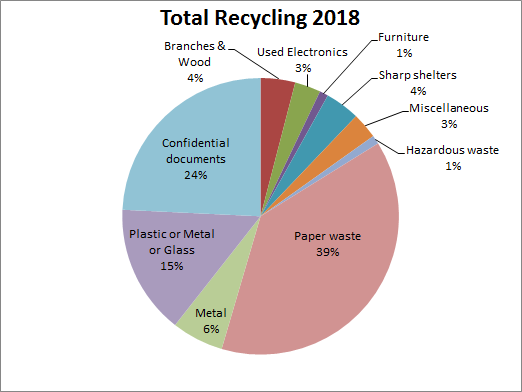
Comparing data with the previous year is another way to demonstrate our progress in recycling, as well as identify areas for improvement. The below bar graph shows the weight in tons of many materials during the year of 2017 (blue) and 2018 (red).
This all adds up to great environmental benefits.This is equivalent to taking 1,663 vehicles off the road and saving over 1 million gallons of gasoline!
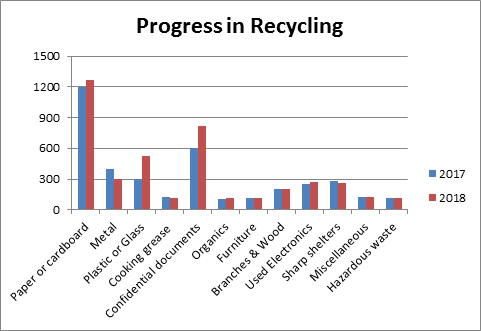
Coming to Japan, It is promoting an increase in the reuse rate of sludge (clay) generated through the production process of ceramic sanitary ware, by returning it to raw material form and reducing the water content. In fiscal 2017, although improvements in the Japanese residential market led to increased sales and production, the generation of waste products fell by 10% year-on-year as reduction activities took effect. Efforts to reduce and reuse waste have also been put into place overseas, and although production increased due to the increase in sales in each market, similar to what is happening domestically, waste generation fell by 5% year-on-year.
The domestic recycling rate remains stable at above 99.5%, but stubbornly remains below 60% overseas, where infrastructure development is lagging. Overseas group production companies will strive to promote the reduction of waste, with the development of waste treatment companies and waste usage as important issues. In 2018 its main motto is to increase the recycling rate by 99%.
The domestic recycling rate remains stable at above 99.5%, but stubbornly remains below 60% overseas, where infrastructure development is lagging. Overseas group production companies will strive to promote the reduction of waste, with the development of waste treatment companies and waste usage as important issues. In 2018 its main motto is to increase the recycling rate by 99%.
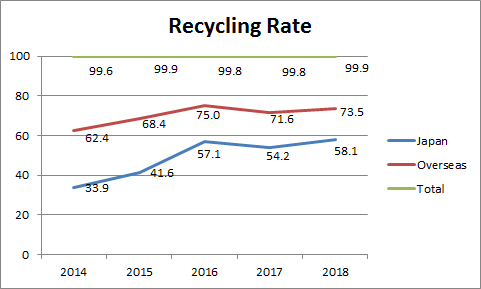
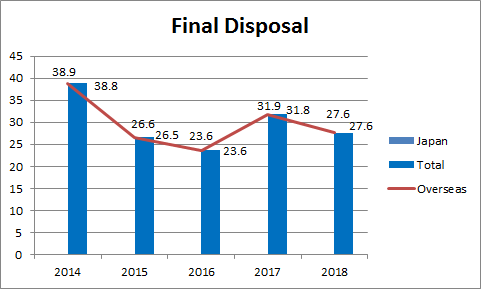
This conference is focusing on all the major aspects in the fields of Waste management. It would be beneficial for all the students and Researchers who ever willing to enter into corporate worlds targeting to the respective fields.
Be a part of it!!!
Conference Highlights
- Environmental chemistry
- Reduce, Reuse, Recycle and Recovery
- Waste and Biomass Valorization
- Biodiesel and Biofuels
- Bio- Electrochemical Treatment Systems
- Bio- Plastics
- Solid Waste Management
- Renewable Resources
- Waste Water treatments
- Bioremediation
- E-Wastes
- Bio- Energy from Waste
- Sustainable waste Management
- Environmental impact Assessment
- Remote Sensing and Satellite Technology
- Landfills
- Microbial Fuel cell Technology
- Recycling Business
- Waste Treatment Technologies
- Waste Processing Industries
- Pollution and Climate Change
To share your views and research, please click here to register for the Conference.
To Collaborate Scientific Professionals around the World
| Conference Date | October 22-23, 2018 | ||
| Sponsors & Exhibitors |
|
||
| Speaker Opportunity Closed | Day 1 | Day 2 | |
| Poster Opportunity Closed | Click Here to View | ||
Useful Links
Special Issues
All accepted abstracts will be published in respective Our International Journals.
- International Journal of Waste Resources
- Advances in Recycling & Waste Management
- Journal of Bioremediation & Biodegradation
Abstracts will be provided with Digital Object Identifier by










